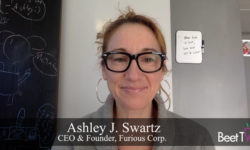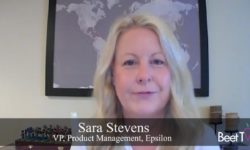The COVID-19 pandemic may be a nightmare for politicians, businesses, society and a great number of individuals.
But, for retailers that were facing challenges targeting customers, the crisis has been an opportunity to grow the data they hold on buyers.
In this video interview with Beet.TV, Amy Lanzi, EVP, Commerce Practice Lead, Publicis Groupe, explains how retailers are emerging from 2020 with richer data reserves and a better handle on targeting.
COVID-19 data boom
“COVID has given our retail partners much more power because they own the shopping ecosystem,” Lanzi says.
“So, throughout COVID, with the increase in e-commerce, they now have a much stronger handle on consumers. Therefore, they have a very strong handle on first-party data.”
Lanzi says such businesses had faced the same challenge as other advertisers – the deprecation of third-party tracking cookies and the diminution of mobile ad identifiers is pushing advertisers to invest in gathering their own “first-party data” – meaning, build and execute on profiles held against known individuals.
Toward ‘joint-party’ data
But Lanzi says it’s not enough for brands to swell their profiles pool in isolation; they need to take that data and combine it with other data sets, in order to build up refined and multi-layered audience sets for activation in ad buying.
These days, several software suites allow advertisers to splice data together in “clean rooms”, and Lanzi says such “privacy-safe commingling” is the way to go.
“We can start to look for joint-party data, joint-party segments, around how we’re both growing retailer X, as well as the manufacturer. When you start doing that, you’re able to understand how to target more effectively. You have a much better handle on the first-party data because it’s feeding from the retailer.”
Targeting shoppers
Lanzi says outfits like Roundel, the former Target Media Network, are benefitting from both having their own media for their on-site and curated partners for off-site.
That means ad buyers can, for example, find someone similar to a given person on Pinterest using data from Roundel.
“I can find you in a moment that you’re not necessarily in shopping mode and be able to send you a better message based on what you’re searching on Pinterest,” she says.
“We’re able to find that person based on what we know about them and what they’re more likely to buy from an intent perspective to deliver the right message to them, and then move them down the funnel faster.”
You are watching “First Party Data: Driving Media Investment and Accountability,” a Beet.TV leadership video series presented by Target’s Roundel For more videos, please visit this page. The views shared on this series do not necessarily reflect the opinion of Target and Roundel.







































